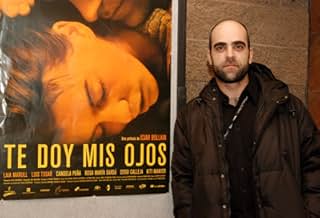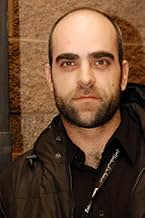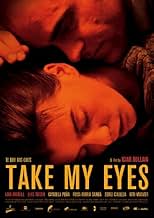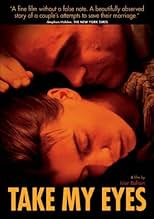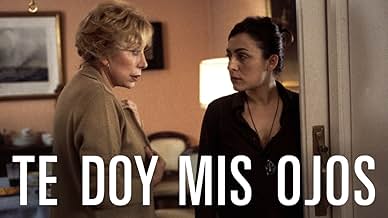IMDb रेटिंग
7.4/10
7.8 हज़ार
आपकी रेटिंग
अपनी भाषा में प्लॉट जोड़ेंOne winter night, Pilar runs away from home. With her, she takes only a few belongings and her son, Juan. Antonio soon sets out to look for her. He says Pilar is his sunshine, and what's mor... सभी पढ़ेंOne winter night, Pilar runs away from home. With her, she takes only a few belongings and her son, Juan. Antonio soon sets out to look for her. He says Pilar is his sunshine, and what's more, "She gave him her eyes"...One winter night, Pilar runs away from home. With her, she takes only a few belongings and her son, Juan. Antonio soon sets out to look for her. He says Pilar is his sunshine, and what's more, "She gave him her eyes"...
- पुरस्कार
- 42 जीत और कुल 17 नामांकन
Rosa Maria Sardà
- Aurora
- (as Rosa María Sardá)
Kiti Mánver
- Rosa
- (as Kiti Manver)
David Mooney
- John
- (as Dave Mooney)
फ़ीचर्ड समीक्षाएं
8Nzup
There are for sure many other films dealing with domestic violence, but I bet no one is better than this one.
This is something that is said to happen quite often in Spain and the movie was shot in order to sensitize people for this issue and to bring to talk about it. It is the story of an ill jealous man, full of complex of inferiority, terrorizing his wife and son.
I loved the love scene between both, where he makes her repeat that she gives all her body to him (Te doy mis ojos, te doy mi boca etc.). It shows perfectly the mental state of the husband who sees his wife as his property.
This was as well an excellent performance of Laia Marull and Luis Tosar.
This is something that is said to happen quite often in Spain and the movie was shot in order to sensitize people for this issue and to bring to talk about it. It is the story of an ill jealous man, full of complex of inferiority, terrorizing his wife and son.
I loved the love scene between both, where he makes her repeat that she gives all her body to him (Te doy mis ojos, te doy mi boca etc.). It shows perfectly the mental state of the husband who sees his wife as his property.
This was as well an excellent performance of Laia Marull and Luis Tosar.
"Take My Eyes (Te doy mis ojos)" is a frank, classy woman in jeopardy/Lifetime TV for Women film.
A couple of elements raise it above Hollywood's unfortunately already tired treatment of abused wives in such films as "Sleeping with the Enemy" or "Enough", among many others.
First is the superb acting by Laia Marull as "Pilar". Her transformation from frightened mouse to tentative independent to an expressive person with a back bone is riveting. She does look distractingly like Annabella Sciorra, but that means she is beautiful and very womanly.
Second is the emphasis less on the physical violence by an abuser that American films revel in (this film opens right after such an incident) than on the psychological impact, both on abuser and victim. Even amidst strife, this is a passionate couple who were very much in love, though we get hints from the beginning that he was controlling, as in the conversations that include the titular phrase. Unlike Hollywood, her final revenge is not violent but in how she uses those words back at him.
Uniquely, we see the husband (Luis Tosar as "Antonio" looking distractingly like the Irish actor James Nesbitt) as a 360 degree person, with his own family stresses, and not just as the usual evil incarnate. Though we don't see how he got into anger-management therapy sessions for abusers that in the U.S. are usually only a result of a court-order and I couldn't tell from the untranslated credits what experts were consulted for these recreations, they are a fascinating look at an attempt to change abusive behaviors. The shrink finds he has to teach these guys even how to have a conversation with their wives to prevent triggers, let alone what to do when rage starts filling their heads.
Another difference is that while the husband jealously fixates on the possibility of her finding a new lover, a sensitive new age guy character invariably appears in the Hollywood versions (and it was entertainingly non-stereotypical that the Scottish brother-in-law is held up as a prized alternative), the threat to his marriage actually comes from her relationships with the women in her life, from family to friends. Through them she becomes more attuned to humiliation as violence than even her hospital records filled with lied about fractures. It was a bit much symbolically to have her suddenly get into artistic presentations of ancient sexy myths, though it was nice that the credits identified each of the paintings discussed.
While sadly this is a familiar story in filmed outline, the film is continually suspenseful and involving as to what they will do, together and apart.
A couple of elements raise it above Hollywood's unfortunately already tired treatment of abused wives in such films as "Sleeping with the Enemy" or "Enough", among many others.
First is the superb acting by Laia Marull as "Pilar". Her transformation from frightened mouse to tentative independent to an expressive person with a back bone is riveting. She does look distractingly like Annabella Sciorra, but that means she is beautiful and very womanly.
Second is the emphasis less on the physical violence by an abuser that American films revel in (this film opens right after such an incident) than on the psychological impact, both on abuser and victim. Even amidst strife, this is a passionate couple who were very much in love, though we get hints from the beginning that he was controlling, as in the conversations that include the titular phrase. Unlike Hollywood, her final revenge is not violent but in how she uses those words back at him.
Uniquely, we see the husband (Luis Tosar as "Antonio" looking distractingly like the Irish actor James Nesbitt) as a 360 degree person, with his own family stresses, and not just as the usual evil incarnate. Though we don't see how he got into anger-management therapy sessions for abusers that in the U.S. are usually only a result of a court-order and I couldn't tell from the untranslated credits what experts were consulted for these recreations, they are a fascinating look at an attempt to change abusive behaviors. The shrink finds he has to teach these guys even how to have a conversation with their wives to prevent triggers, let alone what to do when rage starts filling their heads.
Another difference is that while the husband jealously fixates on the possibility of her finding a new lover, a sensitive new age guy character invariably appears in the Hollywood versions (and it was entertainingly non-stereotypical that the Scottish brother-in-law is held up as a prized alternative), the threat to his marriage actually comes from her relationships with the women in her life, from family to friends. Through them she becomes more attuned to humiliation as violence than even her hospital records filled with lied about fractures. It was a bit much symbolically to have her suddenly get into artistic presentations of ancient sexy myths, though it was nice that the credits identified each of the paintings discussed.
While sadly this is a familiar story in filmed outline, the film is continually suspenseful and involving as to what they will do, together and apart.
The best I can say in favor of this film is that I came out of the cinema with terrible back pain because I had been so extremely tense while watching it. The actors are absolutely brilliant, communicating all that needs to be told, and the plot is never simplistic.
Most European social cinema seems influenced by Ken Loach's movies and this one is no exception. The way time passes slowly and characters try hard to improve their situation reminds a lot of Loach's "Sweet Sixteen", among others.
If there is any weakness to the movie is that I can't say if people who do not share the director's opinions on gender violence would appreciate this movie as much as I have.
Most European social cinema seems influenced by Ken Loach's movies and this one is no exception. The way time passes slowly and characters try hard to improve their situation reminds a lot of Loach's "Sweet Sixteen", among others.
If there is any weakness to the movie is that I can't say if people who do not share the director's opinions on gender violence would appreciate this movie as much as I have.
One of the first negative responses the critics give about the Academy Award is how there is only one award for the rest of the world, that is, Best Foreign Film.
I do like Hollywood films and in fact, about 80% of the movies I watch are Hollywood movies. But this time I am going to write about a Spanish film originally entitled "Te Doy Hasta Mis Ojos", which translates into "Take my Eyes".
The movie is directed by Iciar Bollaín and stars Luis Tosar as Alfonso and Laia Marull as Pilar.
The movie's beginning might as well be a suitable ending with, a determined Pilar and her son running away from home to refugee at Pilar's sister, Ana's house.
The reason and main theme of the movie are soon revealed, Pilar is beaten by her psychotic husband, Alfonso. We then start understanding the difficult, but yet common, couple relationship they live through.
Pilar and Alfonso both love and need each other, which is the main reason why Pilar returns with him. Unfortunately, there are other factors affecting Alfonso, whom even though is attending an anger management program, has several outbursts of anger.
Being the black sheep of his siblings, being at a work he dislikes, and not liking Pilar's new job, which is making him insecure of her faithfulness. The truth is Pilar is only enthusiastic about doing something she likes, her husband misunderstand this leading to the mental disturbing final act.
If I had to briefly describe this movie, I will probably say "Cruelly Real". An uncomfortable feeling is always present. Making you willing to just stop the movie, but at the same time, gluing you to your seat until its ending.
The characters are really well portrayed and even though you feel no sympathy at all for Alfonso, you still try to comprehend the reasons behind his behavior.
I will like to advice it is a really heavy movie but it is surely recommendable, since this is a problem found in societies all around the world, and this movie portrays what a family under this conditions has to live through.
I do like Hollywood films and in fact, about 80% of the movies I watch are Hollywood movies. But this time I am going to write about a Spanish film originally entitled "Te Doy Hasta Mis Ojos", which translates into "Take my Eyes".
The movie is directed by Iciar Bollaín and stars Luis Tosar as Alfonso and Laia Marull as Pilar.
The movie's beginning might as well be a suitable ending with, a determined Pilar and her son running away from home to refugee at Pilar's sister, Ana's house.
The reason and main theme of the movie are soon revealed, Pilar is beaten by her psychotic husband, Alfonso. We then start understanding the difficult, but yet common, couple relationship they live through.
Pilar and Alfonso both love and need each other, which is the main reason why Pilar returns with him. Unfortunately, there are other factors affecting Alfonso, whom even though is attending an anger management program, has several outbursts of anger.
Being the black sheep of his siblings, being at a work he dislikes, and not liking Pilar's new job, which is making him insecure of her faithfulness. The truth is Pilar is only enthusiastic about doing something she likes, her husband misunderstand this leading to the mental disturbing final act.
If I had to briefly describe this movie, I will probably say "Cruelly Real". An uncomfortable feeling is always present. Making you willing to just stop the movie, but at the same time, gluing you to your seat until its ending.
The characters are really well portrayed and even though you feel no sympathy at all for Alfonso, you still try to comprehend the reasons behind his behavior.
I will like to advice it is a really heavy movie but it is surely recommendable, since this is a problem found in societies all around the world, and this movie portrays what a family under this conditions has to live through.
I've already seen this film twice and the subsequent viewing has not diminished much director Iciar Bollain's powerful treatment of domestic violence. In fact, I was actually reluctant to see it again because its potent portrayal of spousal abuse was too disturbing.
There are two things notable about this film that make it stand out from other films on the same subject. One is that it features almost no violence. In fact, there is only one full-blown case of abuse portrayed, and it is less about physical abuse than it is humiliation and emotional abuse.
Another is the nuanced portrayal of the abusive husband. For this, credit must go to actor Luis Tosar, who portrays Antonio. Although the film does its best to give a more balanced portrayal by showing that Antonio does go to therapy and makes some attempt to change his ways, it is Tosar's performance that brings out his human side.
It would have been easy for Tosar to have demonized Antonio, particularly since the actor already a scary appearance, what with his bushy eyebrows and deep-set eyes. But Tosar chooses to take the high road in his performance, focusing on Antonio's deep-seated insecurity and inferiority complex, which are the roots of his violence towards his wife.
His most notable scene is the last one in the film when his wife finally leaves him. As she and her friends go around the apartment packing up her things, the expression on his face is not one of anger but of incomprehension.
But equal credit should be given to Laia Marull, who portrays the wife, Pilar. Because of her performance, the filmmakers literally do not have to show much violence. The literally palpable fear she shows when Antonio is about to go into once of his rages makes that unnecessary.
The film also shows the sexual bond between Pilar and Antonio in order to explain why she continues to return to him despite his abusive behavior, through a frank sex scene that would be possible only in Europe, since American movie makers seem averse to that kind of frankness.
Te doy mis ojos is difficult to watch at times, because of the intensity of its emotional violence. But it is ultimately rewarding for the insights it gives on spousal abuse and the relationship between abusive husband and abused wife.
There are two things notable about this film that make it stand out from other films on the same subject. One is that it features almost no violence. In fact, there is only one full-blown case of abuse portrayed, and it is less about physical abuse than it is humiliation and emotional abuse.
Another is the nuanced portrayal of the abusive husband. For this, credit must go to actor Luis Tosar, who portrays Antonio. Although the film does its best to give a more balanced portrayal by showing that Antonio does go to therapy and makes some attempt to change his ways, it is Tosar's performance that brings out his human side.
It would have been easy for Tosar to have demonized Antonio, particularly since the actor already a scary appearance, what with his bushy eyebrows and deep-set eyes. But Tosar chooses to take the high road in his performance, focusing on Antonio's deep-seated insecurity and inferiority complex, which are the roots of his violence towards his wife.
His most notable scene is the last one in the film when his wife finally leaves him. As she and her friends go around the apartment packing up her things, the expression on his face is not one of anger but of incomprehension.
But equal credit should be given to Laia Marull, who portrays the wife, Pilar. Because of her performance, the filmmakers literally do not have to show much violence. The literally palpable fear she shows when Antonio is about to go into once of his rages makes that unnecessary.
The film also shows the sexual bond between Pilar and Antonio in order to explain why she continues to return to him despite his abusive behavior, through a frank sex scene that would be possible only in Europe, since American movie makers seem averse to that kind of frankness.
Te doy mis ojos is difficult to watch at times, because of the intensity of its emotional violence. But it is ultimately rewarding for the insights it gives on spousal abuse and the relationship between abusive husband and abused wife.
क्या आपको पता है
- ट्रिवियाLaia Marull said her role in this film is the one that has marked her career the most. "It was a very intense movie. I remember the scene in which my character is undressed by his partner and urinates on the balcony. It was a very emotional scene. Working with Luis Tosar is very easy because you look into his eyes and he gives you everything," Marull said. For his part, Tosar revealed a secret about that scene: "When we filmed the scene on the balcony, in which she pees on herself out of fear, I remember being with a sponge between her legs, helping her squeeze it so that the trickle would fall out."
- कनेक्शनReferenced in Spanish Movie (2009)
- साउंडट्रैकFarewell To Gibraltar
Canción popular escocesa
टॉप पसंद
रेटिंग देने के लिए साइन-इन करें और वैयक्तिकृत सुझावों के लिए वॉचलिस्ट करें
- How long is Take My Eyes?Alexa द्वारा संचालित
विवरण
- रिलीज़ की तारीख़
- कंट्री ऑफ़ ओरिजिन
- आधिकारिक साइट
- भाषा
- इस रूप में भी जाना जाता है
- Take My Eyes
- फ़िल्माने की जगहें
- उत्पादन कंपनियां
- IMDbPro पर और कंपनी क्रेडिट देखें
बॉक्स ऑफ़िस
- US और कनाडा में सकल
- $30,496
- US और कनाडा में पहले सप्ताह में कुल कमाई
- $6,440
- 19 मार्च 2006
- दुनिया भर में सकल
- $60,98,633
- चलने की अवधि
- 1 घं 49 मि(109 min)
- रंग
- ध्वनि मिश्रण
- पक्ष अनुपात
- 1.85 : 1
इस पेज में योगदान दें
किसी बदलाव का सुझाव दें या अनुपलब्ध कॉन्टेंट जोड़ें

![Tráiler [OVS]](https://m.media-amazon.com/images/M/MV5BNDFiNzRhYTMtODVmNy00OWQ0LTkwMzAtYjRiNGZmNTk4YjhhXkEyXkFqcGdeQXRyYW5zY29kZS13b3JrZmxvdw@@._V1_QL75_UX500_CR0)



